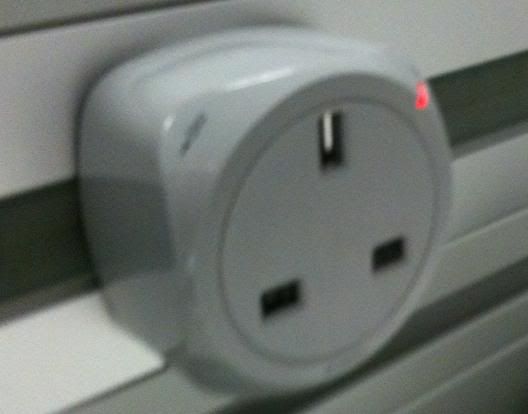http://www.eubiq.com/ <--- Click一下这个link,看看他们的flash demo…
或者简短的解释下:
买一个这样的'power strip'.

然后买几个这样的adaptor

插下去

然后扭一扭

tada ~~ 就是一个插头了~~

然后插电~~

是不是很chio?
一个strip加两个adaptor,盛惠SGD300…
虽然chio,可是想想一下,又觉得很多余,甚至有一种脱裤子放屁的感觉..... 同样的功能,只要有4个plug point就好了,最多给你SGD20块钱,4个不够?装够10个给你,也不用SGD300吧,可是我不明白这种产品,一个正常的procurement 会下订单买..... 可能个人愚蠢,想不到奥妙之处吧~~
现在不谈为什么有人买,现在探讨设计这个product后面的心态,觉得这个product成为新加坡人的经典作实在太对了,因为真的很Singaporean… 也只有用“新加坡心态”来思考才能设计出来....
虽然工作经验不多,可是无论是大学做group project还是在公司做project,发现到有新加坡人在的工作场合都有一个特点:很喜欢把简单的东西复杂化..... 有时候会衍生成为一种官僚主义(要讲的是bureaucracy,不知道中文字用对吗),一个简简单单的approval,会end up需要N多人签名,一个简简单单的meeting,也会搞出很多agenda出来.....
这些多余的meeting,多余的scoreboard,多余的report,多余的程序,外面人看起来是“很pro”,“不简单,这家公司很细心,小小东西都有一套system和procedure”(我公司连how to use laser printer都有’click on print’ 这个SOP,服了没有?),身在其中的人都觉得“很做戏”,就好像这个插头一样,外表看起来很chio,很炫,可是我隔壁桌的老外也和我一样,天天要charge handphone的时候(一个给monitor,一个给laptop用完了)就到处借adaptor(看谁没有用monitor的),然后骂一句“stupid design!”
更夸张的是,complain HR说“这个白痴socket,一个人才分配两个adaptor很不够,可以给多一两个吗?”的时候,HR会自以为是的骂“为什么你那么笨?不会去买extension wire啊?”
炸到.....
纯粹被HR炸到后来这里发发牢骚........ 没有别的意思....
新加坡公司将无法生存与'便宜'或'快',唯一的出路是要更好地'在产品设计'(创新),以及针对高价值市场/消费者,从而提升价值链。但是,创新需要一个创意,可惜由于扩张和镇压新加坡的环境,这并不奇怪,这种过于廉价的产品,服务只是好奇的早期技术的采用,并很快可能是一个时尚,流行或者只赶上要复制由中国和转载以10%的制造成本。如果我是Eubiq的销售经理,我会针对所有新加坡建筑师或室内设计师/承办谁最终用户已经成为IT企业。
ReplyDelete讽刺的是,类似的问题与新加坡的就业市场:新加坡人都知道他们需要提升他们的技能,或爬上企业阶梯向上,而真正的业务工作外包给留下和马来西亚/印度/菲律宾人,所以管理人员为新加坡的唯一途径是进行移动价值链执行管理任务(证明自己的价值和工资),因此,官僚和纸作品诞生了。
Singapore companies will not survive with 'cheaper' or 'faster', the only way out is to be 'better' in product design (innovate), targeting higher value markets/consumers hence moving up the value chain. However, to innovate one need to be creative, unfortunately given expansive and suppressive Singapore environment, it's not surprising to see such overly priced products serving only the curious early technology adopters and soon will be a fad, or if popularity catch up only to be copied and reproduced by china at 10% of the manufacturing cost. If I were the Eubiq's sales manager I will target all Singapore architects or interior designer/contractor who has IT companies as end users.
Ironically, similar issue with Singapore job market: Singaporeans knows they need to upgrade their skill or climb the corporate ladder upwards while the real operational jobs is left outsourced to and performed by Malaysian/Indians/Filipinos, so the only way out for Singaporean managers is to move up the value chain to perform managerial tasks (to justify their worth and salary), hence the bureaucracy and paper works are born.
http://thecrunchtime.blogspot.com/2009/12/singapore-new-product-vs-employees.html